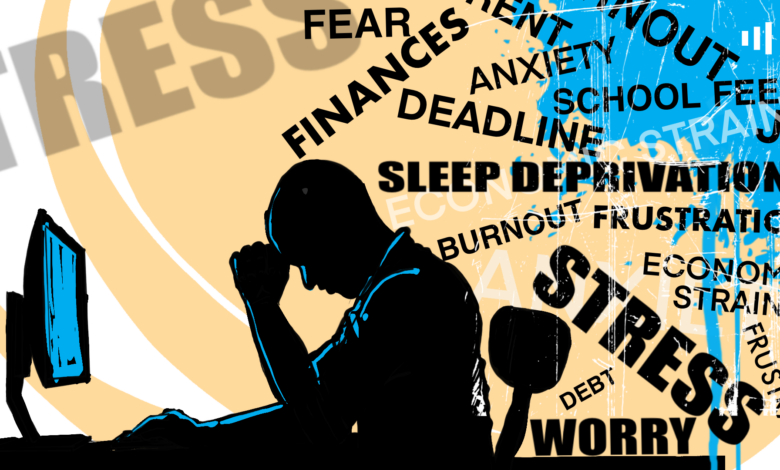Understanding the Mental Health of Nigerian Workers
This year’s World Mental Health Day focuses on ‘Mental Health at Work.’ HumAngle conducted a survey to explore the key issues surrounding this theme. We received many responses. Here is what we found.

Let’s build an avatar for the Nigerian worker. We’ll call her Zuri. She’s 23, works in banking, and, like countless others, feels the heavy strain of her job on her mental health. Each day, she walks into her office with a knot of anxiety, knowing that her workplace offers little in terms of mental health support.
This isn’t just Zuri’s story. It’s a glimpse into the reality of many employees in Nigeria. To commemorate World Mental Health Day, HumAngle surveyed the state of Mental Health at Work, in line with this year’s theme. The survey explores what mental health support looks like in different workplaces, the challenges, and the need for change.
Out of 60 respondents, women made up the majority, accounting for 71.7 per cent. These workers spanned a range of industries, with the largest group—33.9 per cent—working in healthcare, followed by those in communications, finance, and humanitarian work.
The survey found that 98.3 per cent of respondents value their mental health. However, many still find their work mentally exhausting, with 63.3 per cent experiencing burnout and 65 per cent struggling with anxiety. Additionally, 33.3 per cent deal with depression, while 25 per cent face workplace bullying.
Ironically, healthcare workers, who care for others, reported suffering from burnout, anxiety and post-traumatic stress disorder. They also stressed the need to limit work hours and the number of patients they attend to.
A female staff in banking who is currently dealing with anxiety believes that her workplace cares very little about her mental health as staff have to “work even after work hours from home.”
Workplace mental health is a growing concern globally and in Nigeria. The World Health Organisation (WHO) and International Labour Organisation (ILO) have emphasised the need to address the mental health challenges of employees, as depression and anxiety are “costing the global economy nearly $1 trillion” in lost productivity annually.
However, there seem to be workplaces doing a thing or two right. Some have introduced mental health training, offered access to therapy, and organised staff bonding activities.
For instance, a development and a communications worker say their organisations provide them with an in-house counsellor and a mental health department. Another male real estate and construction worker says there has been an “increase in leave and staff bonding” to improve working conditions.
These initiatives, while promising, are often unevenly distributed. Many organisations still fall short of providing adequate support systems. For every company taking steps forward, several others have yet to recognise the importance of mental health support.
So, what do Nigerian workers like Zuri want from their employers? For many, it’s simple: recognition and care. Workers call for “more space to heal and revive,” whether by introducing quiet rooms, more flexible working hours, or fairer sick leave policies that account for mental health.
A female healthcare worker says one of the changes she would like to see is for superiors to “stop threatening to terminate and make the workplace unfavourable for staff.”
According to the WHO, “direct interventions to protect mental health will include counselling services, referral pathways, peer advisory networks and other related initiatives.”
When asked how they maintain positive mental health at work, half of the respondents said they prioritise a work-life balance. Meanwhile, 48.3 per cent take time off, and 35 per cent focus on managing their time and workload effectively. Some choose mindfulness activities, with 28.3 per cent practising meditation and exercise. Additionally, 46.7 per cent set clear boundaries to maintain their mental health, while 40 per cent engage in healthy hobbies.
This survey, despite its small response size, highlights that the mental health struggles faced by Nigerian workers like Zuri are not isolated incidents. They are part of a broader, often silent problem.
The way forward requires a shift in workplace culture, one that prioritises mental health and works towards doing more to support staff. Zuri believes her workplace could do more. She stresses the need for working environments that incorporate rest and recovery time. For her and many others, these changes aren’t just desirable but necessary.
Zuri, a 23-year-old banker in Nigeria, experiences significant workplace stress affecting her mental health, reflecting a broader national issue.
A survey by HumAngle revealed that 98.3% of participants value mental health, yet many face challenges like burnout, anxiety, and workplace bullying, with healthcare workers particularly affected.
While some Nigerian organizations have implemented mental health support, such as in-house counsellors and increased staff bonding, many lack adequate systems. Workers like Zuri desire greater recognition and support from employers, including more flexible hours and fairer policies for mental health leave.
The WHO emphasizes the need for measures like counselling and peer support to enhance workplace mental health.
Support Our Journalism
There are millions of ordinary people affected by conflict in Africa whose stories are missing in the mainstream media. HumAngle is determined to tell those challenging and under-reported stories, hoping that the people impacted by these conflicts will find the safety and security they deserve.
To ensure that we continue to provide public service coverage, we have a small favour to ask you. We want you to be part of our journalistic endeavour by contributing a token to us.
Your donation will further promote a robust, free, and independent media.
Donate HereStay Closer To The Stories That Matter




